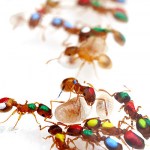Media
Jenny McCarthy, dangerous quack and ignorant fraud, has just signed a contract with that professional peddler of pablum, Oprah Winfrey, to put on a syndicated talk show, among other media puffery. It's quite a step up. Oprah only spreads a kind of fuzzy mind-rot, but McCarthy actually promotes death and disease.
I am pretty much on record that I would not pay for anything online (to be precise, to pay for content - I certainly use the Web for shopping). But with some caveats. I have been known to hit a PayPal button of people who provide content and information I find valuable. And I would presumably pay, though not being happy about it, if the information behind the pay wall is a) unique (i.e., not found anywhere else by any other means) and b) indispensable for my work (i.e., I would feel handicapped without it).
But I am not subscribed to, or paying for, anything right now and haven't been in…
Although I've only written a bit about the recent outbreak of influenza A H1N1 (swine flu), I'd encourage you to take a look at this post by Kent Newsome that discusses where to find reliable information on this topic. This post is particularly nice, because it gives concrete examples of some of the useful things this blogger has learned from these various sources. Granted, most of the sources he discusses are affiliated with ScienceBlogs, but that shouldn't really be surprising, given that there has been so much quality blogging here recently on the topic of swine flu (particularly by…
Yesterday, the Institute of Medicine released a report entitled "Conflict of Interest in Medical Research, Education, and Practice". As far as I can tell, the full report is only available for a fairly substantial charge, but these are some of the main recommendations summed up in the report's press release:
All academic medical centers, journals, professional societies, and other entities engaged in health research, education, clinical care, and development of practice guidelines should establish or strengthen conflict-of-interest policies, the report says. Disclosure by physicians and…
Temnothorax marked for studies of individual behavior at the University of Arizona
Today's New York Times is carrying a profile of myrmecologist Anna Dornhaus. It is nice to see Anna's work receiving such attention, great and important, blah blah blah, but the really important part is this. The editors had the excellent taste to illustrate their piece with some ant and bee photographs of mine.
The online edition also hosts an ant slide show to accompany the story. The Times trimmed the 22 photos I suggested down to an efficient 15, but I've preserved the director's cut here. For…
Thanks to Google, we know that today is the birthday of the first Twitterer:
Kathy Sykes, Professor of Sciences and Society at Bristol University has written a provocative article in the latest New Scientist entitled "Science in the media: Put up or shut up"
The star of Rough Science argues that while science communication often leaves a lot to be desired, scientists themselves need to be less rabid in their attacks on the media:
Does ranting do any good? In some cases it does, especially if science is being carelessly mangled or deliberately distorted. But in many cases communicators are passionate about science and are simply trying to communicate it as clearly as…
Earlier I published a post about an interesting article by Andrew Revkin in today's New York Times about industry's willful ignorance of global warming science. There was an interesting quote in there that I didn't mention earlier about how journalistic practices enabled this campaign of misinformation:
George Monbiot, a British environmental activist and writer, said that by promoting doubt, industry had taken advantage of news media norms requiring neutral coverage of issues, just as the tobacco industry once had.
Will Bunch of Attytood already has some good commentary about this quote as…
Bora points to this report about mega shakeups at Scientific American. The editor for nearly a generation, John Rennie, is out. Nature Publishing Group is now calling the shots. In non-science news Ezra Klein, king of all journolism, is moving to The Washington Post. We live in the age of creative destruction when it comes to media. I'm a dabbler in in writing about science, but as the years go by it seems that the media itself is converging upon my own bloggish means of production. I know that Ross Douthat is going to produce print-worthy column prose for The New York Times, but I have to…
So they say.
I guess even the government is not interested in saving the newspaper business....eh!
Q1: why did they subscribe every employee? Couldn't they buy one copy and put it in the waiting room at the reception desk, or at the water cooler, or in the dining hall? Or, well, they could have come up with some kind of a video-rental store, but for books/newspapers/magazines. Oh, wait!
Q2: why don't they introduce this brand new technology to all their employees? It is called a computer and it can be used to get into a set of tubes called the Internet, where one can go on something called…
Just a collection of links to my and other people's posts/articles I need to have collected all in one place (I will explain later):
1.a.Breaking News
Scientific American Editor, President to Step Down; 5 Percent of Staff Cut
'Scientific American' Editor Out in Reorg
1. b.Death of print: how are newspapers and magazines different?
Defining the Journalism vs. Blogging Debate, with a Science Reporting angle
Rosen's Flying Seminar In The Future of News
Thinking the Unthinkable
2020 vision: What's next for news
Newspapers on the brink-where to next?
Could beautiful design save newspapers…
We all know Twitter can be annoying, but is it really evil? During the past week, you may have heard that there is brand-new neuroscientific evidence proving exactly that. But the hype turns out to be just that: hype.
It all started with a press release from USC about an upcoming PNAS paper by Mary Helen Immordino-Yang and Antonio Damasio, entitled "Neural Correlates of Admiration and Compassion." The USC press release, which was picked up by EurekAlert and other outlets, says:
The finding, contained in one of the first brain studies of inspirational emotions in a field dominated by a focus…
I know it's been a couple of months now since the ScienceOnline'09 and I have reviewed only a couple of sessions I myself attended and did not do the others. I don't know if I will ever make it to reviewing them one by one, but other people's reviews on them are under the fold here. For my previous reviews of individual sessions, see this, this, this, this and this.
What I'd like to do today is pick up on a vibe I felt throughout the meeting. And that is the question of Power. The word has a number of dictionary meanings, but they are all related. I'll try to relate them here and hope you…
He Said, She Said Journalism: Lame Formula in the Land of the Active User by Jay Rosen. And his new podcast with Dave Winer, mostly about the AP fiasco, has been posted here. Worth a read and a listen.
The Associated Press is, I hear, not stupid. So, the only explanation for this is that they are suicidal (but that is not new, of course). And, since it is them who are clogging the system, ruining the newspapers and threatening the Web, perhaps they should be persuaded to just shut down for good. Then we can get a breath of fresh air, the remaining newspapers will have locally produced content that the remaining readers will like, and we in the blogosphere can continue producing our own original content unimpeded. So, how do we help AP ride into the sunset? And fast?
Update - some good…
One of the peculiarities of our media right now is that, as everyone knows, the best political reporting is being done by a couple of comedy shows on cable. Another source that has been surprising me is Rolling Stone, which has unshackled a couple of wild men, Tim Dickinson and Matt Taibbi, to go after the corruption and insanity of American politics — one of those things we once upon a time expected our newspaper journalists to do. I guess the powers-that-be think it's safe to let the drug-addled hippies and punks (and college professors) who read Rolling Stone to know about the failures of…
Scibling Bora has expressed his wish "to end once for all the entire genre of discussing the "bloggers vs. journalists" trope," and tried to do so with perhaps the most massive science-journalism-Web2.0 post evah.
Bora says,
the whole "bloggers will replace journalists" trope is silly and wrong. No, journalists will replace journalists. It's just that there will be fewer of them paid, and more of us unpaid. Some will be ex-newspapermen, others ex-bloggers, but both will be journalists. Instead of on paper, journalism will happen online. Instead of massaging your article to fit into two inches…
One of the (many) motivations for writing the epic post about New Journalism last week was to try to end once for all the entire genre of discussing the "bloggers vs. journalists" trope.
I have collected the responses to the piece here and it is quite flattering that the post got hat-tips from people who have studied the topic for a long time, like Ed Cone, Kirk Ross, Michael Tobis, Henry Gee, Dave Winer and Dan Conover, among others.
My SciBling Dave Dobbs wrote a very good post (recommended) in reply - you need to go and read it.
One of Dave's questions was, to paraphrase, why are there…
Jay Rosen tweets:
New method: slow blogging at PressThink, daily mindcasting at Twitter, work room at FriendFeed. Example: post in gestation http://is.gd/okca
This is how I understand that:
Step 1 is mindcasting on Twitter (often misunderstood for time-wasting lifecasting, e.g., this), Step 2 is aggregation of a number of imported tweets and digestion of them on FriendFeed, Step 3 is aggregation of several FF threads into a more coherent blog post.
The next step, Step 4, could potentially be to aggregate the ideas and knowledge from several blog posts and publish as an article in the…



